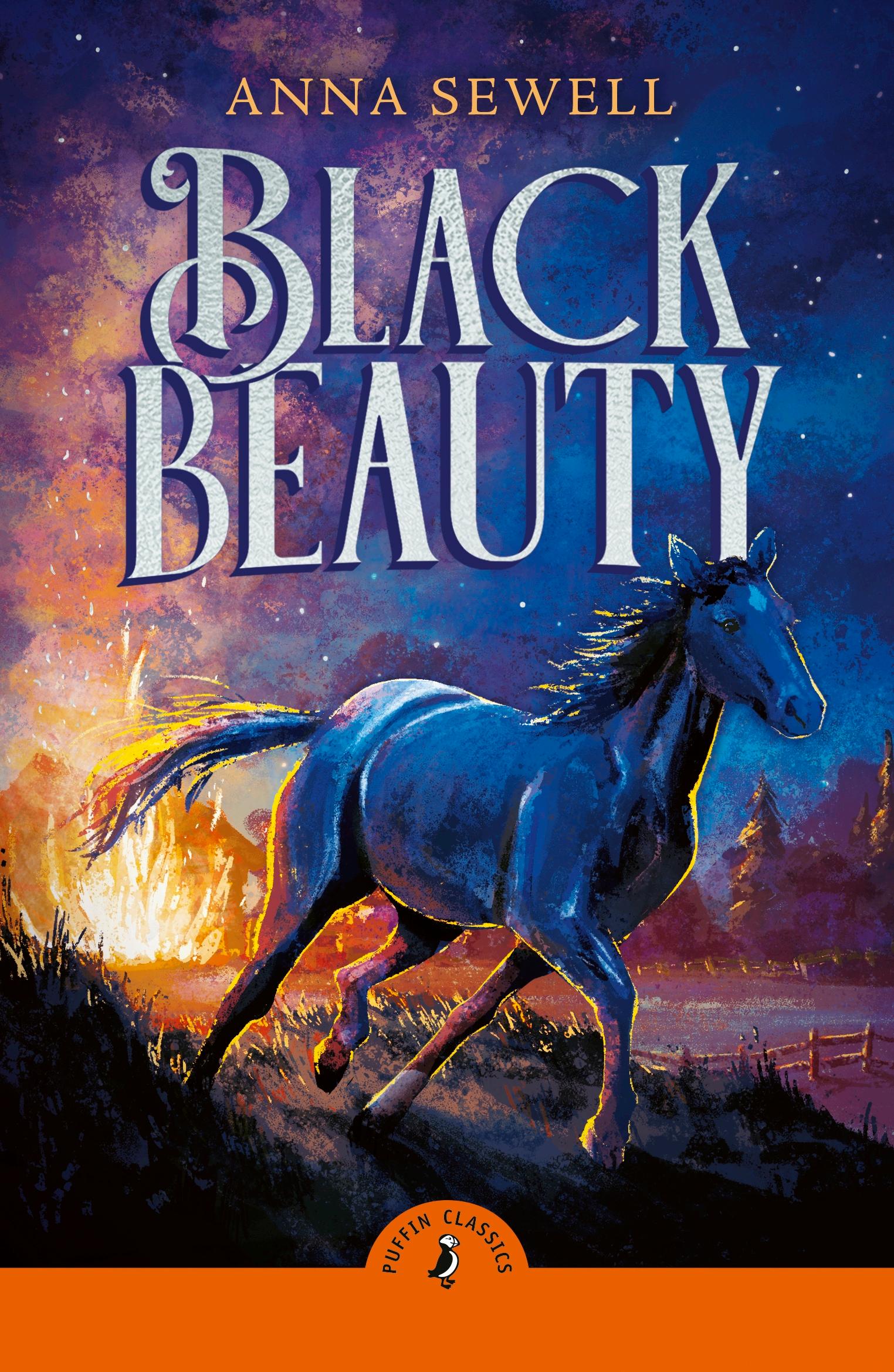

P UFFIN C LASSIC S
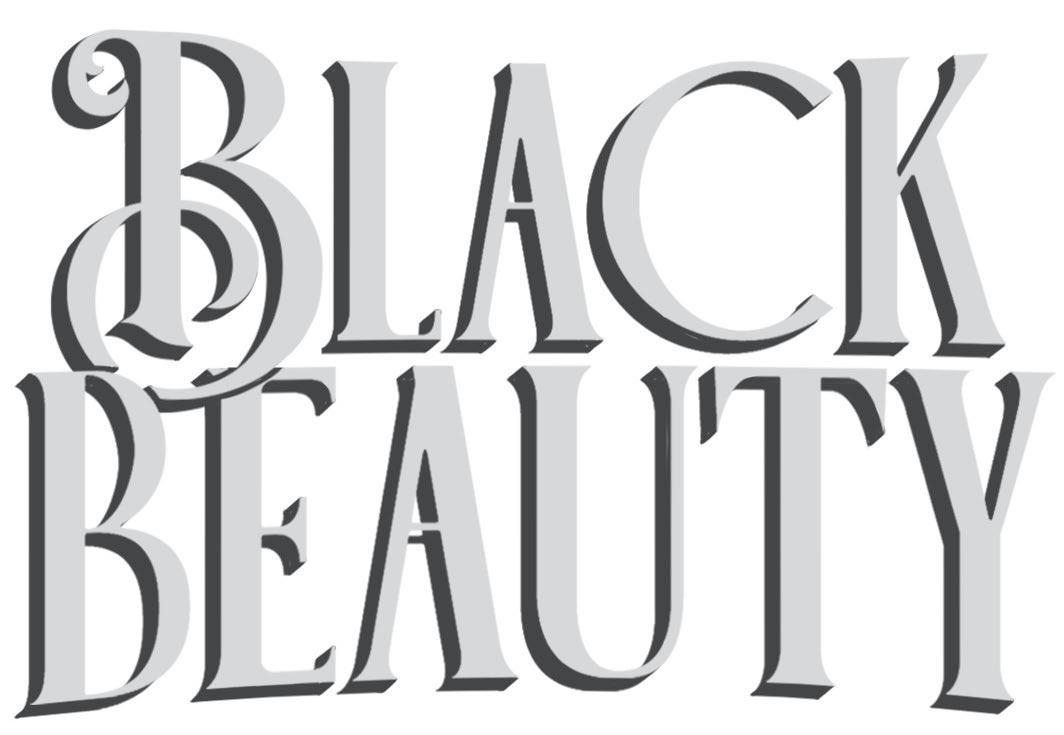
‘ There are a g reat many kinds of men; there are good, thoug htful men like our master, that any horse may be proud to serve; but there are bad, cruel men, who never ought to have a horse or dog to call their own. Beside, there are a g reat many foolish men, vain, ignorant, and careless, who never t rouble themselves to think; these spoil more horses than all, just for want of sense; they don’t mean it, but they do it for all that. I hope you w ill fall into good hands; but a horse never know s who may buy him, or who may dr ive him; it is all a chance for us, but still I say, do your best, where ver it is, and keep up your good name.’
ANNA SEWELL
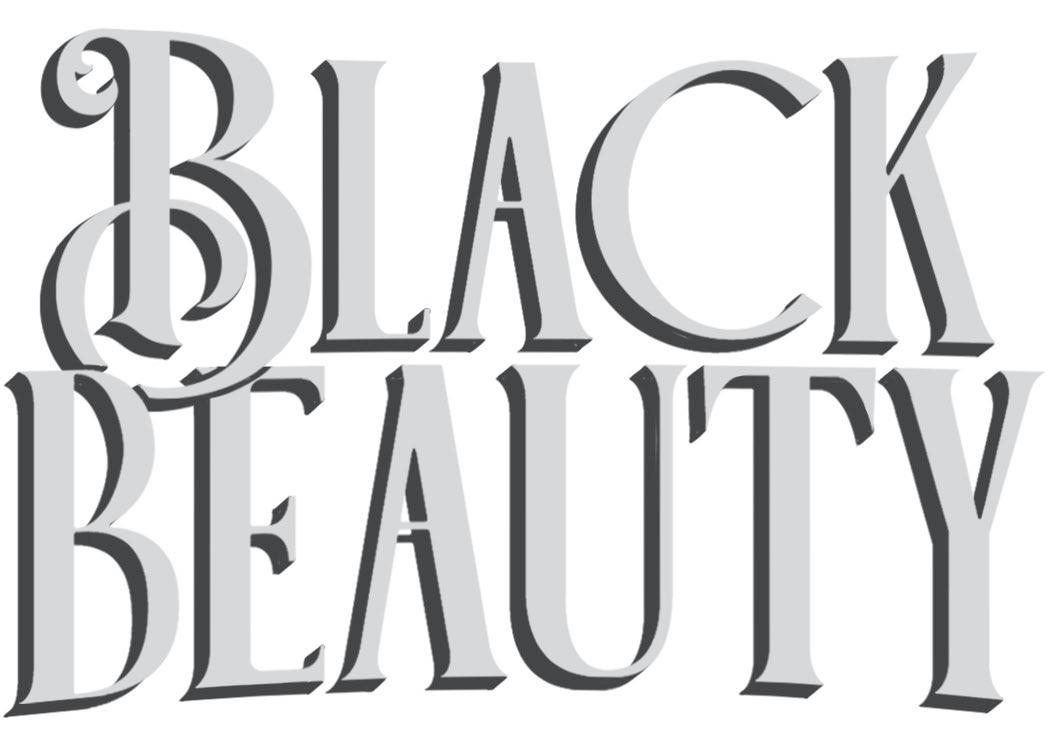
ANNA SEWELL

INTRODUCED BY MEG ROSOFF
Illustrations by C H ARL O T TE H OU GH
INTRODUCED BY MEG ROSOFF
Illustrations by C H ARL O T TE H OU GH
P UFFIN C LASSIC S
P UFFIN C LASSIC S
P UFFIN C LASSIC S
PUFFIN BOOKS
UK | USA | Canada | Ireland | Australia India | New Zealand | South Africa
Puffin Books is part of the Penguin Random House group of companies whose addresses can be found at global.penguinrandomhouse.com.
www.penguin.co.uk www.puffin.co.uk www.ladybird.co.uk
First published
First published in Puffin Books Reissued 20, 20
This edition published 202 00
Introduction copyright © Meg Rosoff, 200 Endnotes copyright © Penguin Books, 200
Penguin Random House values and supports copyright. Copyright fuels creativity, encourages diverse voices, promotes freedom of expression and supports a vibrant culture. Thank you for purchasing an authorized edition of this book and for respecting intellectual property laws by not reproducing, scanning or distributing any part of it by any means without permission. You are supporting authors and enabling Penguin Random House to continue to publish books for everyone. No part of this book may be used or reproduced in any manner for the purpose of training artificial intelligence technologies or systems. In accordance with Article (3) of the DSM Directive 20/0, Penguin Random House expressly reserves this work from the text and data mining exception.
Set in Minion by Palimpsest Book Production Limited, Falkirk, Stirlingshire
Printed and bound in Great Britain by Clays Ltd, Elcograf S.p.A.
The authorized representative in the EEA is Penguin Random House Ireland, Morrison Chambers, 32 Nassau Street, Dublin D02 YH6
A CIP catalogue record for this book is available from the British Library
All correspondence to: Puffin Books
Penguin Random House Children’s
One Embassy Gardens, Viaduct Gardens, London SW BW
Penguin Random Hous e is committed to a sustainable future for our business, our readers and our planet. is book is made from Forest Stewardship Council® certified paper.
int rod uc ti on b y
MEG ROSOFF
I discovered Black Beauty in the summer of , about the same time I discovered Sgt Pepper’s Lonely Hearts Club Band. My copy came from the gloomy basement of the family home, from the shelf on which my parents’ old books were stored. It had an antique, dusty look (wedged up a ga ins t B ob, So n of Battl e , my f ather’s child hood favour ite) and I picked it up reluctantly. Didn’t everyone prefer shiny new books, pristine and unread? And yet . . . there weren’t enough horse books in the world to satisfy my hunger, and I’d nearly run out. This shabby volume would have to do.
Back then, I wouldn’t have looked at the publication date (it hadn’t yet occurred to me that books, like people, had birthdays). But even if I had, would not have meant much to an eleven-year-old from the suburbs of Boston, USA, for whom the world of Victorian London seemed as remote as the pyramids of Egypt. I began to read slowly, war ily, eyeing the brown-edged pages with
suspicion. Perhaps (I thoug ht) it would be dusty and ancient inside as well. Perhaps the words would be oldfashioned and the stor y stilted. Perhaps it would (horror of horrors!) turn out to be about something other than horses. But the beautiful black colt on the cover drew me in, promised galloping adventures of the sort I could barely live without. Horses, always horses.
And then came the opening sentence: ‘The first place that I can well remember was a large pleasant meadow with a pond of clear water in it’ and the realization that this was no ordinary horse book, but the autobiography of a horse. I was sold. And read on. And so, through the gen t le , un fl i nch in g e yes of Bl ack Be au ty, I met po or sensitive Ginger, to whom men had always been cruel; Merr ylegs, a pony of g reat charm and wisdom; Sir Oliver the disillusioned war horse and a wide variet y of human heroes and rogues – kind masters and crooked grooms, cabbi es an d d ru nk ard s, th e fa ntas tically w ealthy, the casually cruel, the desperately poor. Black Beaut y himself proved an unfor ge tta ble gui de to ni ne teenth- centur y Eng land, a sensitive observer, by turns joyous, despairing, resig ned.
Revisiting the book as an adult, I could practically recite whole scenes thanks to the number of times I read and reread it all those years ago. And there was Black Beauty’s dignified voice, just as I’d remembered it, telling me once more what it is to be a horse, to roll in a meadow on a vi
warm summer day, to stand for hours in the rain w ith only a kind word for sustenance, to be loved dearly or treated cruelly, to offer one’s hear t and soul to the world and desire only fair treatment in return.
Fifty million copies of Black Beauty have been sold in the years since Anna Sewell’s publisher paid her £ for the story. She had hoped it might serve to alert a few of her contemporar ies to the feelings and sufferings of ‘dumb animals’, and in that respect Black Beauty has succeeded beyond her wildest dreams.
But when you return to Black Beauty, some day in the distant future (perhaps with children of your own), I p redi ct t ha t it wi ll n ot be Ann a Se well’s voice yo u remember. It will be his.
C on t en t s
PART ON E
My Early Home
The Hunt
My Breaking In
Birtwick Park
A Fair Start
Liberty
Ginger
Ginger’s Stor y Continued
Mer rylegs
A Talk in the Orchard
Plain Speaking
A Stormy Day
The Devil’s Trade Mark
James Howard
The Old Ostler
The Fire
John Manly’s Talk
Going for the Doctor
Only Ig norance
Joe Green
The Parting
Earlshall
PA RT T WO
A Strike for Liberty
The Lady Anne
Reuben Smith
How it Ended
Ruined, and Going Down-hill
A Job-horse and His Drivers
Cockneys
A Thief
A Humbug
PA RT TH REE
A Horse Fair
A London Cab Horse
An Old War Horse
Jerr y Barker
The Sunday Cab
The Golden Rule
Dolly and a Real Gentleman
Seedy Sam
Poor Ginger
The Butcher
The Election
A Friend in Need
Old Captain and His Successor
Jerr y’s New Year
PART F OUR
Jakes and the Lady
Hard Times
Farmer Thoroughgood and His Grandson Willie
My Last Home
PART O N E
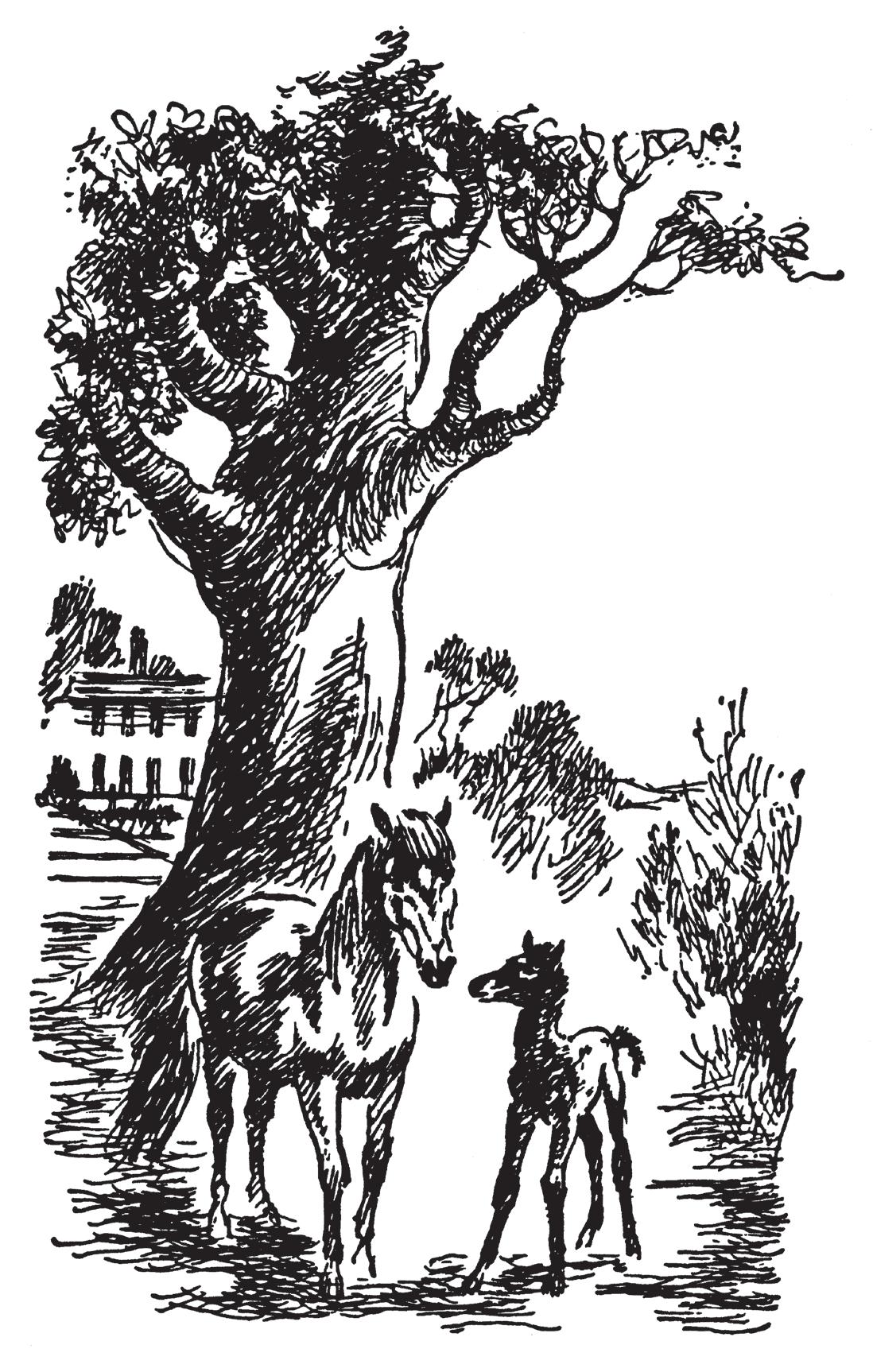
My Early Home
The first place that I can well remember was a large pleasant meadow with a pond of clear water in it. Some shady trees leaned over it, and rushes and waterlilies g rew at the deep end. Over the hedge on one side we looked into a ploughed field, and on the other we looked over a gate at our master’s house, which stood by the roadside; at the top of the meadow was a plantation of fir trees, and at the bottom a running brook overhung by a steep bank.
Whilst I was young I lived upon my mother’s milk, as I could not eat grass. In the day time I ran by her side, and at night I lay down close by her. When it was hot, we used to stand by the pond in the shade of the trees, and when it was cold, we had a nice warm shed near the plantation. As soon as I was old enough to eat g rass, my mother used to go out to work in the day time, and came back in the evening.
There were six young colts in the meadow besides me; they were older than I was; some were nearly as large as
grown-up horses. I used to run with them, and had great fun; we used to gallop all together round and round the field, as hard as we could go. Sometimes we had rather rough play, for they would frequently bite and kick as well as gallop.
One day, when there was a good deal of kicking, my mother whinnied to me to come to her, and then she said:
‘I wish you to pay attention to what I am going to say to you. The colts who live here are very good colts, but they are cart-horse colts, and, of course, they have not learned manners. You have been well bred and well born; your father has a great name in these parts, and your grandfather won the cup two years at the Newmarket races; your grandmother had the sweetest temper of any horse I ever knew, and I think you have never seen me kick or bite. I hope you will grow up gentle and good, and never learn bad ways; do your work with a good will, lift your feet up well when you trot, and never bite or kick even in play.’
I have never forgotten my mother’s adv ice; I knew she was a wise old horse, and our master thought a great deal of her. Her name was Duchess, but he often called her Pet.
Our master was a good, kind man. He gave us good food, good lodging, and kind words; he spoke as kindly to us as he did to his little children. We were all fond of him, and my mother loved him ver y much. When she saw him at the gate, she would neigh with joy, and trot up to him. He would pat and stroke her and say, ‘Well, old Pet, and how is your
little Darkie?’ I was a dull black, so he called me Darkie; then he would give me a piece of bread, which was ver y good, and sometimes he brought a carrot for my mother. All the horses would come to him, but I think we were his favourites. My mother always took him to the town on a market day in a little gig.
There was a ploughboy, Dick, who sometimes came into our field to pluck blackberries from the hedge. When he had eaten all he wanted, he would have what he called fun w ith the colts, throwing stones and sticks at them to make them gallop. We did not much mind him, for we could gallop off; but sometimes a stone would hit and hur t us.
One day he was at this game, and did not know that the master was in the next field; but he was there, watching what was going on: over the hedge he jumped in a snap, and catching Dick by the arm, he gave him such a box on the ear as made him roar with the pain and surprise. As soon as we saw the master, we trotted up nearer to see what went on.
‘Bad boy!’ he said, ‘bad boy! to chase the colts. This is not the first time, nor the second, but it shall be the last – there – take your money and go home, I shall not want you on my farm again.’ So we never saw Dick any more. Old Daniel, the man who looked after the horses, was just as gentle as our master, so we were well off.
The Hunt
Before I was two years old, a circumstance happened which I have never forgotten. It was early in the spring; there had been a little frost in the night, and a light mist still hung over the plantations and meadows. I and the other colts were feeding at the lower par t of the field when we heard, quite in the distance, what sounded like the cry of dogs. The oldest of the colts raised his head, pricked his ears, and said, ‘There are the hounds!’ and immediately cantered off followed by the rest of us to the upper part of the field, where we could look over the hedge and see several fields beyond. My mother and an old riding horse of our master’s were also standing near, and seemed to know all about it.
‘They have found a hare,’ said my mother, ‘and if they come this way, we shall see the hunt.’
And soon the dogs were all tearing down the field of young wheat next to ours. I never heard such a noise as they made. They did not bark, nor howl, nor whine, but kept on a ‘yo! yo, o, o! yo! yo, o, o!’ at the top of their voices.
After them came a number of men on horseback, some of them in green coats, all galloping as fast as they could. The old horse snorted and looked eagerly after them, and we young colts wanted to be galloping with them, but they were soon away into the fields lower down; here it seemed as if they had come to a stand; the dogs left off barking, and ran about every way with their noses to the ground.
‘They have lost the scent,’ said the old horse; ‘perhaps the hare will get off.’
‘What hare?’ I said.
‘Oh! I don’t know what hare; likely enough it may be one of our own hares out of the plantation; any hare they can find will do for the dogs and men to run after’; and before long the dogs began their ‘yo! yo, o, o!’ again, and back they came all together at full speed, making straight for our meadow at the par t where the high bank and hedge over-hang the brook.
‘Now we shall see the hare,’ said my mother ; and just then a hare wild with fright rushed by, and made for the plantation. On came the dogs, they burst over the bank, l e ap t th e stre am, a nd came da shin g acros s the fi eld, followed by the huntsmen. Six or eight men leaped their horses clean over, close upon the dogs. The hare tried to get through the fence; it was too thick, and she turned sharp round to make for the road, but it was too late; the dogs were upon her with their wild cries; we heard one shriek, and that was the end of her. One of the huntsmen
rode up and whipped off the dogs, who would soon have torn her to pieces. He held her up by the leg, torn and bleeding, and all the gentlemen seemed well pleased.
As for me, I was so astonished that I did not at first see what was going on by the brook; but when I did look, there was a sad sight; two fine horses were down, one was strugg ling in the stream, and the other was groaning on the grass. One of the riders was getting out of the water covered with mud, the other lay quite still.
‘His neck is broken,’ said my mother.
‘And serve him r ight too,’ said one of the colts.
I thought the same, but my mother did not join with us.
‘Well! no,’ she said, ‘you must not say that; but though I am an old horse, and have seen and heard a great deal, I never yet could make out why men are so fond of this sport; they often hurt themselves, often spoil good horses, and tear up the fields, and all for a hare or a fox, or a stag, that they could get more easily some other way ; but we are only horses, and don’t know.’
Whilst my mother was say ing this, we stood and looked on. Many of the r iders had gone to the young man; but my master, who had been watching what was going on, was the first to raise him. His head fell back and his arms hung down, and everyone looked ver y serious. There was no noise now; even the dogs were quiet, and seemed to know that something was wrong. They carried him to our mas ter’s h ouse. I heard after ward s that it was young
George Gordon, the Squire’s only son, a fine, tall young man, and the pr ide of his family.
T he re was n ow r idin g o ff in all d ire ct ion s to t he doctor’s, to the far rier’s, and no doubt to Squire Gordon’s, to let him know about his son. When Mr Bond, the farrier, came to look at the black horse that lay groaning on the grass, he felt him all over, and shook his head; one of his leg s w as bro ken. Then so meo ne ran to ou r master’s house and came back with a gun; presently there was a loud bang and a dreadful shriek, and then all was still; the black horse moved no more.
My mother seemed much troubled; she said she had known that horse for years, and that his name was ‘Rob Roy’; he was a good bold horse, and there was no vice in him. She never would go to that par t of the field afterwards.
Not many days after, we heard the church bell tolling for a long time; and looking over the gate we saw a long strange black coach that was covered with black cloth and was drawn by black horses; after that came another and another and another, and all were black, while the bell kept tolling, tolling. They were carr ying young Gordon to the churchyard to bury him. He would never ride again. What they did with Rob Roy I never knew; but ’twas all for one little hare.
My Breaking In
Iwas now beginning to g row handsome; my coat had grown fine and soft, and was bright black. I had one white foot, and a pretty white star on my forehead. I was thought ver y handsome; my master would not sell me till I was four years old; he said lads ought not to work like men, and colts ought not to work like horses till they were quite g rown up.
When I was four years old, Squire Gordon came to look at me. He examined my eyes, my mouth, and my legs; he felt them all down; and then I had to walk and trot and gallop before him; he seemed to like me, and said, ‘When he has been well broken in, he w ill do very well.’ My master said he would break me in himself, as he should not like me to be frightened or hurt, and he lost no time about it, for the next day he began.
Ever y one may not know what breaking in is, therefore I will describe it. It means to teach a horse to wear a saddle and bridle and to carr y on his back a man, woman, or child; to go just the way they w ish and to go quietly.
Besides this, he has to learn to wear a collar, a crupper, and a breeching, and to stand still whilst they are put on; then to have a cart or a chaise fixed behind him, so that he cannot walk or trot without dragging it after him: and he must go fast or slow, just as the driver wishes. He must never start at what he sees, nor speak to other horses, nor bite, nor kick, nor have any will of his own; but always do his master’s will, even though he may be very tired or hungr y; but the worst of all is, when his harness is once on , he m ay ne it h er jump for joy nor l i e dow n for weariness. So you see this breaking in is a great thing.
I had of course long been used to a halter and a headstall, and to be led about in the field and lanes quietly, but now I was to have a bit and a bridle; my master gave me some oats as usual, and, after a good deal of coaxing, he got the bit into my mouth, and the bridle fixed, but it was a nasty thing! Those who have never had a bit in their mouths, cannot think how bad it feels; a great piece of cold hard steel as thick as a man’s finger to be pushed into one’s mouth, between one’s teeth and over one’s tongue, with the ends coming out at the corner of your mouth, and held fast there by straps over your head, under your throat, round your nose, and under your chin; so that no way in the world can you get rid of the nasty hard thing; it is very bad! yes, very bad! at least I thought so; but I knew my mother always wore one when she went out, and all horses did when they were grown up; and so, what with the nice
oats, and what with my master’s pats, kind words, and gentle ways, I got to wear my bit and bridle.
Next came the saddle, but that was not half so bad; my master put it on my back very gently, whilst old Daniel held my head; he then made the gir ths fast under my body, patting and talking to me all the time; then I had a few oats, then a little leading about, and this he did every day till I began to look for the oats and the saddle. At length, one morning my master got on my back and rode me round the meadow on the soft grass. It certainly did feel queer; but I must say I felt rather proud to carry my master, and as he continued to ride me a little ever y day, I soon became accustomed to it.
The next unpleasant business was putting on the iron shoes; that too was very hard at first. My master went with me to the smith’s forge, to see that I was not hurt or got any fright. The blacksmith took my feet in his hands one after the other, and cut away some of the hoof. It did not pain me, so I stood still on three legs till he had done them all. Then he took a piece of iron the shape of my foot, and clapped it on, and drove some nails through the shoe quite into my hoof, so that the shoe was firmly on. My feet felt very stiff and heavy, but in time I got used to it.
And now having got so far, my master went on to break me to harness; there were more new things to wear. First, a stiff heavy collar just on my neck, and a bridle with great side-pieces against my eyes called blinkers, and blinkers
indeed they were, for I could not see on either side, but only straight in front of me; next there was a small saddle w ith a nast y stiff strap that went right under my tail; that was the crupper : I hated the crupper – to have my long tail doubled up and poked through that strap was almost as bad as the bit. I never felt more like kicking, but of course I could not kick such a good master, and so in time I got used to ever ything, and could do my work as well as my mother.
I must not forget to mention one par t of my training, which I have always considered a very great advantage. My master sent me for a fortnight to a neighbouring farmer’s, who had a meadow which was skir ted on one side by the railway. Here were some sheep and cows, and I was turned in amongst them.
I shall never forget the first train that ran by. I was feeding quietly near the pales which separated the meadow from the railway, when I heard a strange sound at a distance, and before I knew whence it came – with a rush and a clatter, and a puffing out of smoke – a long black train of something flew by, and was gone almost before I could draw my breath. I turned, and galloped to the further side of the meadow as fast as I could go, and there I stood snorting with astonishment and fear. In the course of the day many other trains went by, some more slowly; these drew up at the station close by, and sometimes made an awful shriek and groan before they stopped. I thought it very dreadful, but
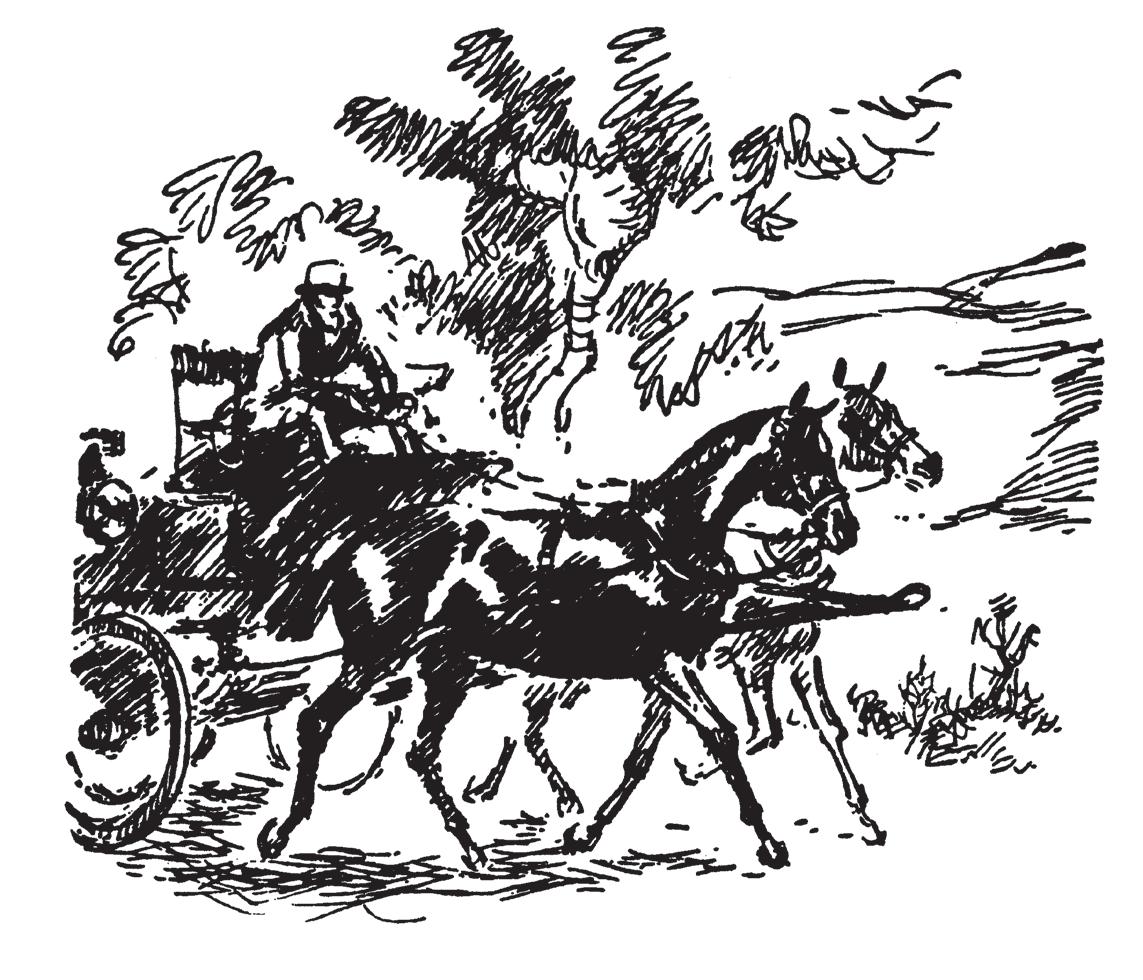
the cows went on eating ver y quietly, and hardly raised their heads as the black frightful thing came puffing and grinding past.
For the first few days I could not feed in peace; but as I found that this terr ible creature never came into the field, or did me any harm, I began to disregard it, and very soon I cared as little about the passing of a train as the cows and sheep did.
Since then I have seen many horses much alarmed and restive at the sight or sound of a steam engine; but thanks
to my good master’s care, I am as fearless at railway stations as in my own stable.
Now if any one wants to break in a young horse well, that is the way.
My master often drove me in double harness w ith my mother because she was steady, and could teach me how to go better than a strange horse. She told me the better I behaved, the better I should be treated, and that it was w isest always to do my best to please my master; ‘But,’ said she, ‘there are a g reat many kinds of men; there are good, thoughtful men like our master, that any horse may be proud to serve; but there are bad, cruel men, who never ought to have a horse or dog to call their own. Beside, there are a g reat many foolish men, vain, ignorant, and careless, who never trouble themselves to think; these spoil more horses than all, just for want of sense; they don’t mean it, but they do it for all that. I hope you will fall into good hands; but a horse never knows who may buy him, or who may drive him; it is all a chance for us, but still I say, do your best, wherever it is, and keep up your good name.’
Bir tw ick Park
At this time I used to stand in the stable, and my coat was brushed every day till it shone like a rook’s wing. It was early in May, when there came a man from Squire Gordon’s, who took me away to the Hall. My master said, ‘Good-bye, Darkie; be a good horse, and always do your best.’ I could not say good-bye, so I put my nose into his hand; he patted me kindly, and I left my first home. As I lived some years with Squire Gordon, I may as well tell something about the place.
S quire Gordon’s Park sk irted th e vi llage o f Birtw ick.
It was e nte re d by a large iro n g ate, at whi ch s tood the fi rst lo dge , and the n you tro tted al ong on a smoot h ro ad b etwee n clumps of large old trees; th en another lod ge and an o th er gate whi ch b rought you to the hou se a nd the gard en s. Be yo nd thi s l ay the home padd oc k , t h e o l d o rcha rd, an d the stables. There was acco mm o dation f or many ho rs es and car riages ; b ut I nee d o nly d esc rib e th e s table in to whi ch I was taken ; thi s was ve ry ro o my, wit h fo ur good stalls; a large
